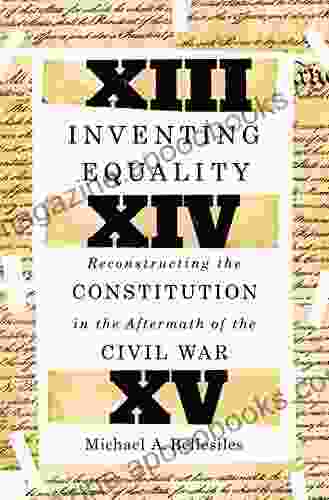Reconstructing the Constitution in the Aftermath of the Civil War: A Comprehensive Analysis

The American Civil War stands as a watershed moment in United States history, leaving an enduring impact on the nation's social, political, and legal fabric. The conflict not only tested the limits of the Constitution but also reignited fundamental debates about the nature of the Union, the rights of states and individuals, and the future of slavery. In the aftermath of this cataclysmic event, the task of reconstructing the Constitution became paramount, a daunting challenge that would shape the course of American history for generations to come.
The passage of the Thirteenth, Fourteenth, and Fifteenth Amendments to the Constitution marked a transformative era in American law. These amendments represented a profound shift in the nation's constitutional framework, addressing the lingering issues of slavery, citizenship, and voting rights.
Thirteenth Amendment (1865): Abolished slavery and involuntary servitude throughout the United States, effectively ending the legal institution that was central to the Southern economy and social Free Download.
Inventing Equality: Reconstructing the Constitution in the Aftermath of the Civil Warby Michael A. Bellesiles4.4 out of 5
Language : English File size : 3556 KB Text-to-Speech : Enabled Screen Reader : Supported Enhanced typesetting : Enabled X-Ray : Enabled Word Wise : Enabled Print length : 323 pages X-Ray for textbooks : Enabled Fourteenth Amendment (1868): Granted full citizenship to all persons born or naturalized in the United States, regardless of race or previous condition of servitude. It also guaranteed equal protection under the law, providing a vital safeguard against discrimination.
Fifteenth Amendment (1870): Prohibited states from depriving citizens of the right to vote based on race, ensuring that the newly freed slaves had the ability to participate fully in the political process.
The implementation of the Reconstruction Amendments faced numerous obstacles and fierce resistance, particularly in the former Confederate states. White Southerners resentfully opposed the extension of civil and political rights to African Americans, leading to widespread violence, voter suppression, and legal challenges.
Black Codes: Southern states enacted laws to restrict the rights of African Americans, limiting their access to education, employment, and public accommodations.
Ku Klux Klan: A terrorist organization emerged to intimidate and suppress African American political activity through violence and intimidation.
Redemption Movement: White Southerners attempted to regain control of state governments, using violence and disenfranchisement to overturn Reconstruction gains.
The Supreme Court played a pivotal role in interpreting the Reconstruction Amendments, shaping their meaning and impact for generations to come. The Court's decisions reflected the shifting political and social landscape of the post-Civil War era, as justices wrestled with the complex issues of federalism, race relations, and the limits of government power.
Slaughter-House Cases (1873): Narrowly construed the Fourteenth Amendment's Privileges or Immunities Clause, limiting the scope of federal protection for individual rights.
Civil Rights Cases (1883): Declared the Civil Rights Act of 1875 unconstitutional, weakening federal enforcement of the Fourteenth Amendment's Equal Protection Clause.
Plessy v. Ferguson (1896): Upheld the constitutionality of racial segregation, establishing the infamous "separate but equal" doctrine.
Reconstruction came to an abrupt end in 1877 with the withdrawal of federal troops from the South and the rise of white supremacy. The Compromise of 1877, which settled the disputed presidential election of 1876, effectively abandoned the cause of Reconstruction, leaving many of its promises unfulfilled.
The legacy of Reconstruction remained deeply contested, with its failures and successes continuing to shape American politics and race relations. While the Reconstruction Amendments laid a foundation for civil rights and equality, their implementation proved to be a tortuous journey marked by resistance, setbacks, and ongoing struggles for justice.
The Reconstruction period in American history stands as a complex and tumultuous chapter that tested the nation's resilience and its commitment to the ideals of equality and democracy. The Constitution, as reconstructed in the aftermath of the Civil War, bore the imprint of the conflict and the unresolved tensions between freedom and oppression.
The ongoing debate over the legacy of Reconstruction serves as a reminder of the unfinished business of American history. The struggle for civil rights, equal justice, and the full realization of the nation's founding principles continues to this day, bearing witness to the enduring impact of the transformative era that reshaped the constitutional landscape of the United States.
Books:
- "Reconstruction: America's Unfinished Revolution, 1863-1877" by Eric Foner
- "The Civil War and Reconstruction" by James M. McPherson
- "Jim Crow and Reconstruction: The Triumph of White Supremacy in the South" by C. Vann Woodward
Online Resources:
- The Library of Congress: Reconstruction Era National Historic Landmark Theme Study (https://www.loc.gov/rr/program/bib/ourdocs/reconstruction.html)
- The National Park Service: Reconstruction Era National Historical Park (https://www.nps.gov/reer/index.htm)
- The Gilder Lehrman Institute: The American Civil War and Reconstruction (https://www.gilderlehrman.org/history-by-era/civil-war-reconstruction)
4.4 out of 5
| Language | : | English |
| File size | : | 3556 KB |
| Text-to-Speech | : | Enabled |
| Screen Reader | : | Supported |
| Enhanced typesetting | : | Enabled |
| X-Ray | : | Enabled |
| Word Wise | : | Enabled |
| Print length | : | 323 pages |
| X-Ray for textbooks | : | Enabled |
Do you want to contribute by writing guest posts on this blog?
Please contact us and send us a resume of previous articles that you have written.
 Book
Book Novel
Novel Page
Page Chapter
Chapter Text
Text Story
Story Genre
Genre Reader
Reader Library
Library Paperback
Paperback E-book
E-book Magazine
Magazine Newspaper
Newspaper Paragraph
Paragraph Sentence
Sentence Bookmark
Bookmark Shelf
Shelf Glossary
Glossary Bibliography
Bibliography Foreword
Foreword Preface
Preface Synopsis
Synopsis Annotation
Annotation Footnote
Footnote Manuscript
Manuscript Scroll
Scroll Codex
Codex Tome
Tome Bestseller
Bestseller Classics
Classics Library card
Library card Narrative
Narrative Biography
Biography Autobiography
Autobiography Memoir
Memoir Reference
Reference Encyclopedia
Encyclopedia Helena Fairfax
Helena Fairfax Rets Griffith
Rets Griffith Jeremy Burfoot
Jeremy Burfoot Irene Kim
Irene Kim Helen Hein
Helen Hein Scotty V Casper
Scotty V Casper Iantha Ussin
Iantha Ussin I R Wright
I R Wright Henry Burnett
Henry Burnett Heidi J S Tworek
Heidi J S Tworek Heather Cleary
Heather Cleary Ilse Kenis
Ilse Kenis Htebooks
Htebooks John Rozier Cannon
John Rozier Cannon Hui Shan Chen
Hui Shan Chen M E Carter
M E Carter Steve A Anderson
Steve A Anderson Hermann Bauer
Hermann Bauer Hugh Neill
Hugh Neill Harry Harrison
Harry Harrison
Light bulbAdvertise smarter! Our strategic ad space ensures maximum exposure. Reserve your spot today!

 Robert HeinleinUnveiling the Secrets of Financial Freedom: A Comprehensive Review of "Honor...
Robert HeinleinUnveiling the Secrets of Financial Freedom: A Comprehensive Review of "Honor... Derrick HughesFollow ·2.1k
Derrick HughesFollow ·2.1k Junichiro TanizakiFollow ·18k
Junichiro TanizakiFollow ·18k Craig BlairFollow ·19.8k
Craig BlairFollow ·19.8k Walt WhitmanFollow ·17.3k
Walt WhitmanFollow ·17.3k Rick NelsonFollow ·11.1k
Rick NelsonFollow ·11.1k John MiltonFollow ·13.5k
John MiltonFollow ·13.5k Cason CoxFollow ·13.4k
Cason CoxFollow ·13.4k Oscar BellFollow ·15.1k
Oscar BellFollow ·15.1k

 Stanley Bell
Stanley BellUnlock the Secrets of Powerball Success: Master the...
Prepare to shatter the odds and transform...

 Ernest J. Gaines
Ernest J. GainesPatti Smith Horses 33 55: A Photographic Journey into a...
Journey into the raw and...

 Isaiah Price
Isaiah PriceMoyamoya Disease Diagnosis And Treatment: A Comprehensive...
Moyamoya Disease...

 Joseph Foster
Joseph FosterRecent Advances in Ophthalmology, Volume 14
Editor: [Editor's...
4.4 out of 5
| Language | : | English |
| File size | : | 3556 KB |
| Text-to-Speech | : | Enabled |
| Screen Reader | : | Supported |
| Enhanced typesetting | : | Enabled |
| X-Ray | : | Enabled |
| Word Wise | : | Enabled |
| Print length | : | 323 pages |
| X-Ray for textbooks | : | Enabled |













